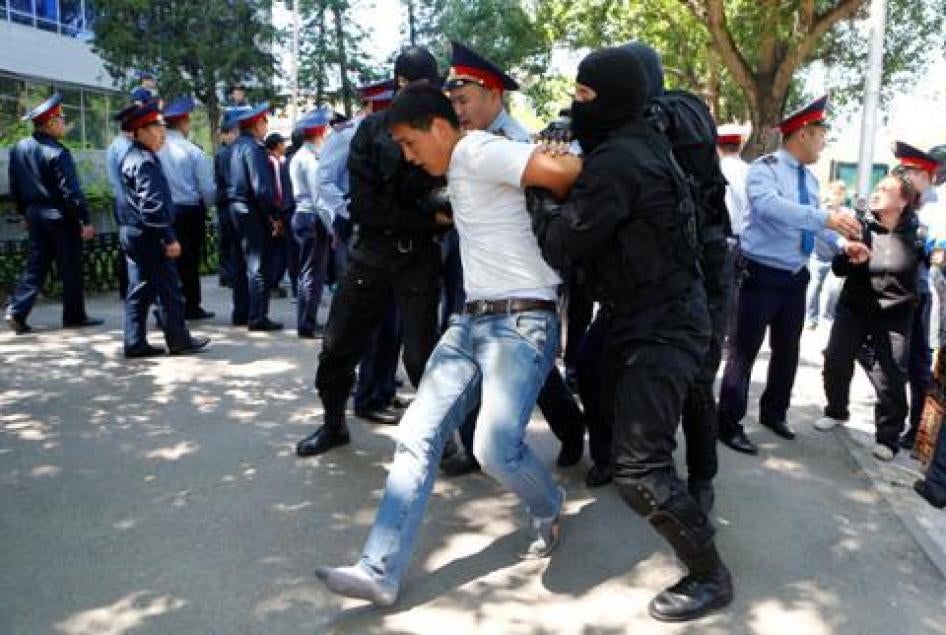U.S. President-elect Donald Trump appears to believe that Kazakhstan’s 25-year history represents a “miracle.” Yet independence day celebrations on December 16 took place under the cloud of an economic crisis. The economy is expected to grow by only 0.5 percent in 2016, the lowest rate since 1998, which is causing deep hardship for ordinary people.
Kazakhstan’s leadership, however, is putting on a brave face by trying to focus attention elsewhere. Advertisements for Astana Expo 2017, the country’s latest PR extravaganza, are everywhere—on airplanes, bus stops, even the lapels of government security guards.
Indeed, few other middle-income countries work harder, or arguably are more successful, at nurturing a global image of prosperity, diversity, and responsibility. Astana’s key international victory in 2016—winning a two-year term on the UN Security Council beginning in January 2017—fits this pattern.
But such promotion campaigns are disconnected from the reality on the ground. For many years, Kazakh President Nursultan Nazarbayev’s approach of “economy first, political reforms later” downplayed the dissonance. In Kazakhstan, there are no free elections, little open speech is permitted, and the government significantly represses human rights, but at least some ordinary citizens saw economic gains pile up.
Now, however, the reality that the approach was, rather, “economy first, political reforms never” is becoming apparent.
The Kazakh government proclaims that it supports improved governance, for instance by building an independent civil service, regular consultation with civil society, and judicial reform as part of its plan to become one of the top 30 most developed economies by 2050. In reality, its heavy-handed control of society and a crackdown on dissent have been intensifying. Over the past two years the economic downturn has put the authorities on edge, and speculation about who will follow Nazarbayev, who is 76, has added to pressure.
Kazakhstan’s heavy-handed control of society and a crackdown on dissent have been intensifying.
Events in mid-2016 certainly rattled the government. First, in April and May, there were rare public protests in several cities against government plans for land reform that would extend the period foreigners could lease land in Kazakhstan from ten years to 25. Then three alleged Islamist extremist attacks on civilian and military targets in June and July left 30 people dead (including the attackers). Since then, the authorities’ drive to rein in social movements that could, in their view, pose a threat has won the upper hand over any implementation of much-needed social and political reforms.
In short, Kazakhstan is moving backward—and human rights and the rule of law are suffering.
Anara Ibrayeva, the leader of the NGO Kadyr Kasiyet, which works to protect human rights defenders, has the data to prove it. Her small office in Kazakhstan’s futuristic-looking capital gathers information on the routine harassment by the state and persecution of activists, including human rights supporters, environmental and labor advocates, women’s rights campaigners, lawyers, and Facebook bloggers. At one point, she pulled out a flow chart that shows the rise in the numbers of cases her group has documented—247 individuals faced threats or harassment between October 2015 and July 2016, up from 78 in the previous nine months. Many cases go unreported, she said—the true number is probably three times as high as her figure.
Another chart lists new laws proposed or adopted in the last two years that appear aimed at restricting the activities of NGOs and controlling their funding. The measures are subtler than Russia’s “foreign agents” law, which targets groups that receive foreign funding, Ibrayeva said. “But the impact is the same.” Her group was also undergoing a time-consuming tax inspection at the time of my visit—another tactic used by the government to tie up resources and prevent groups from working normally.
Then there are Lalisa Kharkova and Nurbek Kushakbaev, trade unionists who have experienced the heavy-handed grip of the authorities in recent years. Awkwardly for the government, independence day also marked the fifth anniversary of clashes in Zhanaozen, in western Kazakhstan, which followed prolonged strikes in the oil industry and left at least 12 people dead. The violence was a shock for the country, but steps that the government subsequently took to better regulate labor relations have had largely the opposite effect.
Over snacks in an Almaty café, Kushakbaev, who works for a union of oil industry construction workers in western Kazakhstan, spoke of the intimidation he’s faced since the Zhanaozen incident. He described a summons by security services, threats to his family, and sabotage to his car. “I have to remain on guard,” he said.
Kharkova is chair of the Confederation of Independent Trade Unions of Kazakhstan. Because of restrictions introduced in a 2014 trade union law, she has been unable to complete registration of her confederation and its member unions, making normal union activities impossible. During our meeting, she received calls from union colleagues about lawsuits that the Justice Ministry has filed against two industrial unions. The suits seek to liquidate the unions for not completing burdensome registration requirements. Since our meeting, Kharkova’s confederation has itself been served a lawsuit seeking its liquidation. It is now fighting the action in court.
In 2015 and 2016, the International Labour Organization issued stern criticism of the unjustified restrictions in Kazakhstan’s trade union law. Kharkova hopes the authorities will withdraw the lawsuits and allow her union to operate without interference. “They label us extremists … just for doing union work,” she said.
Far from Almaty, in a courtroom in Atyrau, western Kazakhstan, two activists, Maks Bokaev and Talgat Ayan, experienced the full force of the authorities’ crackdown on dissent on November 28. In April, the two men used Facebook to call for a peaceful protest in the city against Nazarbayev’s land reform proposals. They asked for permission to hold the protest, which was denied, but hundreds came out anyway. The police aggressively broke up attempts in other cities to hold protests in May, having rounded up over two dozen activists, including Bokaev and Ayan in advance. Although others were released after serving out sentences for alleged administrative offenses, the two men were charged with the vague criminal offense of “inciting social discord.” Following a trial marred by
procedural violations, each was sentenced to five years in prison—simply for exercising his right to peaceful protest.
THE CASE FOR REFORM
Kazakhstan has an obligation to fulfill the commitments in international human rights treaties that it has voluntarily signed, and it’s in the government’s interest to do so. Kazakhstan craves recognition by international bodies. It wants to join several committees of the Organization for Economic Cooperation and Development (OECD), the Paris-based rich nations’ club, to prepare, it hopes, for future membership. However, its legal crackdown on NGOs appears to violate OECD standards. The new restrictions on foreign funding are already negatively affecting the work of donors and other foreign organizations. And Kazakhstan’s international partners could echo the International Labour Organization’s criticism unless Astana addresses it.
The sooner Kazakhstan resolves the disconnect between reputation and reality, the sooner ordinary people will gain greater rights protections. Only then will the country have a real shot at achieving its lofty international aspirations. This should not take a miracle.










